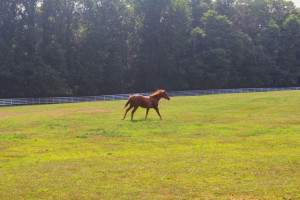By James Romano
COLTS NECK – Century Stables, one of the declining number of thoroughbred breeding farms in Monmouth County, is for sale. Located on County Road 537, the estate home possesses 50-plus acres of gated land.
Once the front gate opens, a long, tree lined driveway lies ahead. Light posts enliven the asphalt path as a pond, with an immaculate fountain, is situated directly to the right.
Not only does the home have a great view of the surge the fountain produces in the front of the property, but also sites of rolling grassy fields with paddocks, a 20-stall barn, a caretaker’s cottage, a gazebo, and a children’s play house are visible.
The naturally-lit home includes living spaces that hold high ceilings on both levels. The Cinderella staircase accompanied by a banquet-sized dining room, great room with wet bar, wood-burning fireplace, and 40-foot long kitchen would catch any real estate connoisseur’s eye.
Judith Kent Sessa, 82, is the owner of Century Stables. She and her late husband bred countless thoroughbreds over the 35-year-span since they have owned the property. “I can no longer keep it. I used to have 50 horses here and now I am down to five,” Sessa said. “I am 82 years old and I don’t need all this expense now.”
Sessa would love to still be involved in the horse breeding business. Once the remaining five are sold, no more horses will be kept at Century Stables unless the new owner keeps it a breeding farm. Sessa has six children who live in Florida, but they do not wish to continue their parents’ work, as five of them are not involved in the horseracing world.
“Many nice horses have come through here,” Sessa said. “At one time, we had 25 mares having babies.” The property is certainly able to house numerous horses and their offspring.
Elden Klayman, DVM, an equine veterinarian and owner of Colts Head Veterinary Services, has been taking care of Century Stables bred horses since 1985. “It’s just another farm that we may never get back,” Klayman said. “When you lose a farm, the value is in the property. It is real estate that can be developed.”

“The thoroughbred breeding industry has not been at its highest level for awhile now,” Karyn Malinowski, Ph.D., professor and director at Rutgers University Equine Science Center, said. “The Thoroughbred Breeder’s Association and breeding incentive awards have almost become nonexistent.”
New Jersey horse racing farms, owners, breeders, and trainers simply cannot compete with surrounding states, such as Delaware, New York, and Pennsylvania, that have casino gaming income. In these neighboring states, slots at the racetrack fund the purses for the racing industry in that state. As a result, owners and trainers are racing their horses more often in those states.
“There’s only racing 2 or 3 days a week here,” Sessa said. “Jersey-bred horses don’t race enough. The tracks even encourage trainers and horses from other states to come race.”
Racehorses in New Jersey, other than Triple Crown Winner American Pharoah who is running in the $1.75 million William Hill Haskell Sunday, do not have the greatest track records.
“If racing isn’t coming back, people won’t be breeding,” Sessa said.
“It would be a dream come true if another horse breeder came here, but there are so few nowadays,” Sessa said. “It’s been wonderful and I loved every minute of it. It’s time to move on.”
Sessa has lived in Fort Lauderdale, Florida since she was 10 years-old. She would venture north to Century Stables in the summer when racing was affluent. The acreage has been strictly used for summer stays and breeding only.














